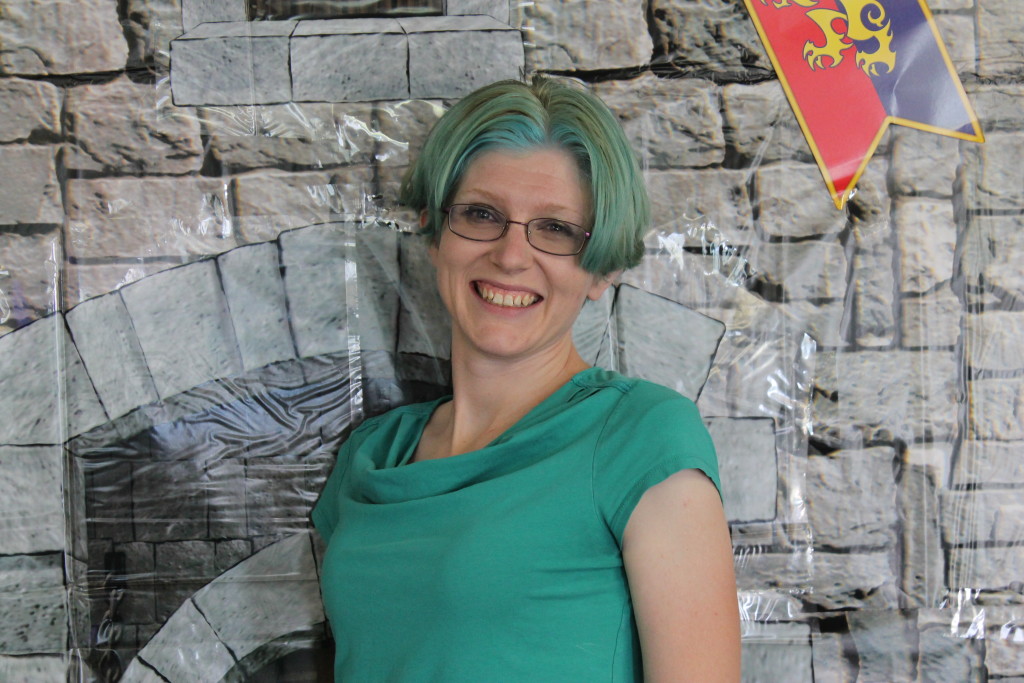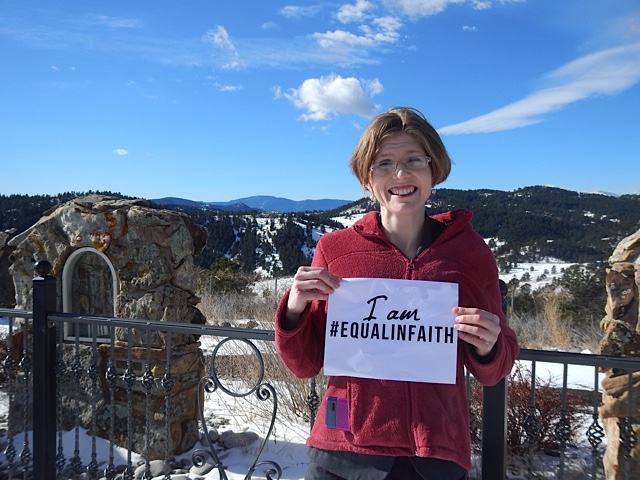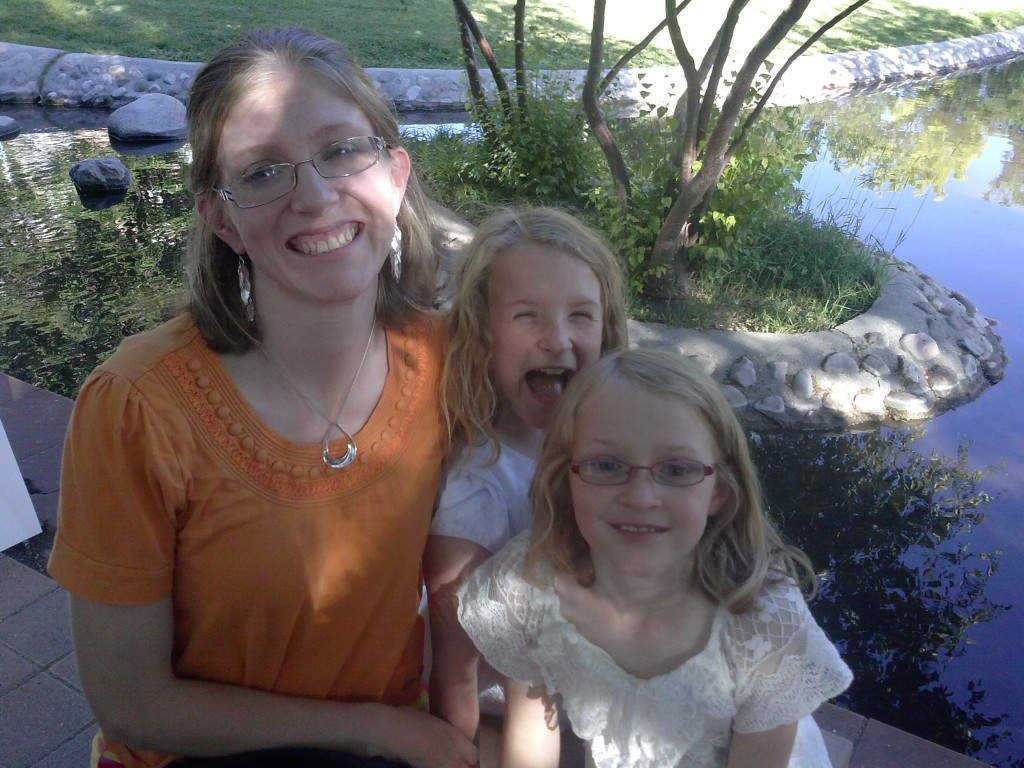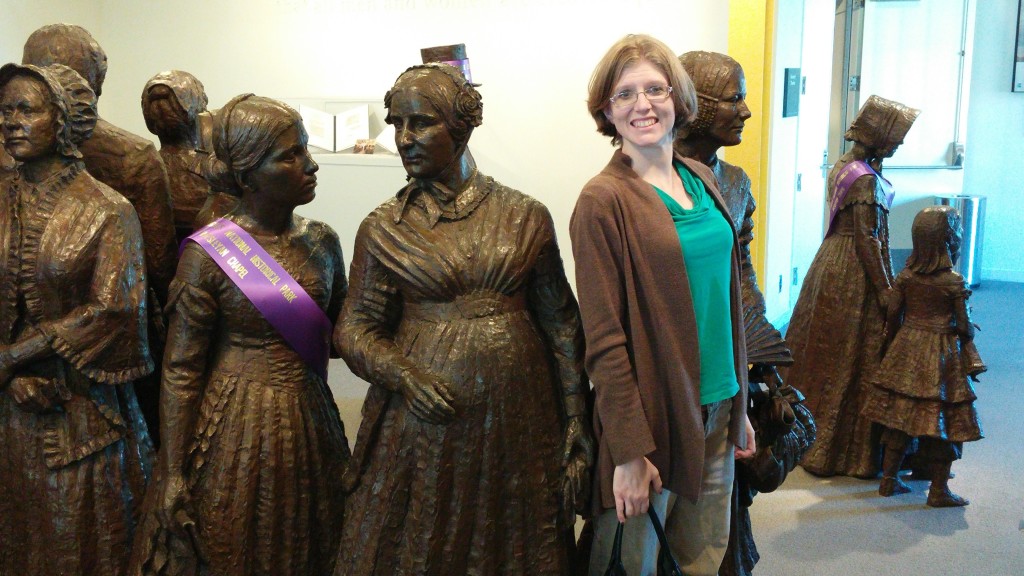Today’s Sunday Spotlight comes from Elizabeth! She discusses what she loves about the church, and her hopes for change in the future.
When I was in high school, I began dating a boy who was Mormon. He didn’t try to be a member missionary toward me or anything – I just noticed that his church was super important to him. After about 6 months or so, I started asking him about it, and he answered my questions and gave me a Book of Mormon. I read the whole thing through (plus the Doctrine and Covenants) and had a strong spiritual experience that led me to wanting to be baptized. My parents were against it, however, so I had to wait until my 18th birthday. At that point, I had managed to complete all 4 years of seminary and my Young Woman Recognition by working on my own at home. The day after my baptism, I left for BYU. My 15th baptiversary is this week.
There are two callings I’ve had that I particularly loved. The first was when I lived in the Foreign Language Student Housing at BYU. I was called to be a Ward Dinner Coordinator. This meant more than just organizing a potluck – every month on Fast Sunday, we’d have a dinner with the theme from one of the foreign language apartments. We’d eat food from one of the countries represented, and the apartment would do a cultural presentation. I worked with them on planning the meal, then had to figure out how to produce it on a large scale and divide it up amongst a bunch of different cooks. We had borscht, paella, homemade hummus among other things and were entertained by capoeira, unique music, and more. It was really an amazing calling and gave me good experience with organizing people that still serves me today.
My other favorite calling was being a Sunday School teacher to the 16-17 year olds. My first year, we were studying the Old Testament, and I had a small class of very bright girls. We dove into the scriptures, going off-manual and learning things that they probably wouldn’t have learned elsewhere. My bachelor’s degree was in Ancient Near Eastern Studies, so it was an exciting chance to use my Hebrew background to really magnify my calling.
I love the service that we give to each other. Whenever there’s a medical emergency, the meals are set up right away. Moving, childcare, etc. – it’s amazing what people will help with. I like knowing that I can depend on my fellow ward members when I need to, and that I can always find ways to help them out.
I also love the mind-blowingly expansive theology that we have. It’s what attracted me to Mormonism in the first place. I love the idea that there is still revelation going on, that we have always existed and will continue progressing after death, that there is a place for everyone in heaven, that God created worlds without end and we’re just one of the many that He’s made. It’s amazing and I wish we’d focus more upon it.
Unfortunately, there are many examples of gender inequality in the Church, some of which I’ve experienced and some of which I’ve only heard about. It permeates every aspect of the Church, though, which has grown increasingly frustrating to me over time. It’s true that there can be some really great people in the church, and through their efforts the sexism is smoothed out a bit, but a system that only works when everyone is on their best behavior is not a very good system. For everyone who can say they’ve had a really good experience, there’s someone who can say they had an equally bad experience.
One major pet peeve of mine is the status of the Relief Society. It’s touted as the largest women’s society in the world, but can you really call it that if it’s overseen by men? We study nothing but the words of men in a women’s meeting, words that our general leaders didn’t even get to choose. The General Relief Society has lost all the autonomy that it once had, all its resources, and now its leaders are rotated out more quickly than some bishoprics.
The most personal concerns for me right now, though, are for my daughters. In just a couple years, the boys in their class will start serving in the church by passing the sacrament and collecting fast offerings, while my daughters will only look forward to sitting passively in the pews each Sunday. In a few years more, they’ll be expected to discuss sex behind closed doors with an older member of the opposite gender, something the boys in their class will never be expected to do.
I am concerned about the messages that they get at church. I was catapulted into Mormon Feminism when my daughter went from wanting to be an artist-ski instructor-lawyer to a stay-at-home mom after a lesson in Primary. I don’t want them to think that they have to abandon their dreams in order to be right before God. Other messages, like the overemphasis on marriage or the licked-cupcake chastity lessons, are just as awful, but something that boys don’t have to face. It needs to change.
I have plenty of other ideas of changes we could make in the Church beyond just ordination! We are locked into a certain kind of church culture, which isn’t necessarily the best way of doing things. One major item that I’d like to see changed is to de-emphasize the 1950’s nuclear family as the ideal our lessons are based around. There are so, so many people who do not fit this idealized version of the family, and it can be hurtful or even damaging to perpetuate this focus. Instead of emphasizing people’s familial status, we need to refocus on our relationships with Jesus Christ.
Further, as a church that touts itself as being family-focused, there are a lot of policies that are not family friendly. Church is terrible for children – it’s not developmentally appropriate to expect them to sit quietly for 3 hours. Sacrament meeting doesn’t even acknowledge their existence most of the time and is the furthest thing from engaging. Instead of structuring church around the needs of the adults, what if we actually thought of the children? Many churches have a children’s time during the service and a class for children during the service, so church becomes something they can participate in and not just endure. Furthermore, the multiplicity of meetings, the practice of packing wards into a single building so they meet in the late morning or even afternoon, and the calling of parents of young children into leadership positions are all things that detract from the family. There are so many policies – not doctrine – that we could change if we truly wanted to be family friendly.
One more change I would love to see is to the calling system. On the one hand, the method we use now allows for leadership inspiration and to let us serve in a variety of capacities that we may not have chosen for ourselves. On the other hand, it also completely disallows for personal inspiration on how to serve and may not take a person’s talents into consideration. I would love to see bishoprics counseling with members to determine where they feel called and capable of serving, instead of relying solely on their own inspiration.
I remember when Ordain Women was first announced in the Feminist Mormon Housewives Facebook group. I was excited, but not confident enough to put up my own profile. I followed Ordain Women closely from its inception, longing to go to the actions but prevented by my circumstances. Finally, when Kate was excommunicated last year, I decided I was done being passively supportive. I wanted to use my voice, so I submitted my profile just a couple days later.
I attended the vigil for Kate up in Salt Lake. My daughters wanted to come along, because they wanted to meet the lady who had the same questions that they did about not being able to serve the sacrament or become bishop. We walked from the park to the grounds of the Church Office Building, then dropped our handkerchiefs and photos at the doors with everyone else. We then returned to the park and participated in a litany, remembering our foremothers in the gospel. I don’t know what kind of impression it made on my daughters, but it touched me very deeply.
I ended up being on Fox News’ coverage of the event, and a former member of the ward posted on Facebook basically saying that I was apostate, a bad parent, and needed to leave. I didn’t know him very well, but it hurt that anyone would say such things about me. Fortunately, the majority of my friends and family who have said anything have been very positive. I’ve reconnected with old friends over a shared point of belief, and many of my friends outside the Church have been impressed by my involvement. I know that I have been luckier than other OW supporters, and I am grateful for that.
I was fairly certain of my beliefs when I submitted my profile – it was only due to fear that I delayed in submitting. Events of the past year, though, have made me even more firm in my beliefs. Women need to be ordained in order to right many wrongs that exist within the church today.
I do see some progress, which gives me hope for the future. The Church has been working on improving its optics with regards to women, and broadcasting the priesthood session over the Internet is a huge change that we can thank Ordain Women for. I know that these changes can feel like baby steps, and it can frustrating that it is moving so slowly, but they are still changes. Whether they want to admit it or not, our leadership has become aware of the issues.
I also find hope as the subject comes up with family and friends. As I mentioned above, I’ve had largely positive reactions to my involvement with Ordain Women – it has actually strengthened my relationship with my in-laws, and I’ve had multiple friends tell me privately that they agree, but they feel that they can’t say anything for various reasons. I think that as long as we keep fueling the conversation, the issue will remain at the top of people’s minds, and we will begin to see more changes in attitudes. At some point, our leadership will take this to the Lord, and I believe that they will be told that women need to be ordained.










